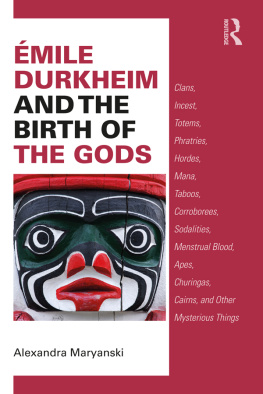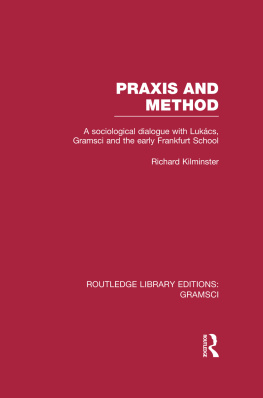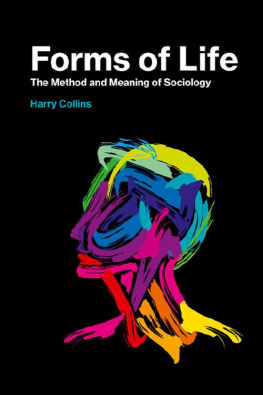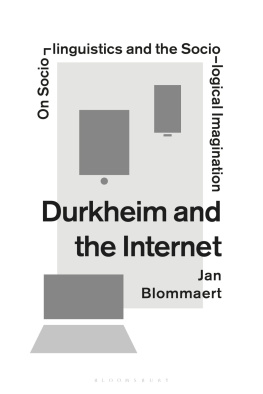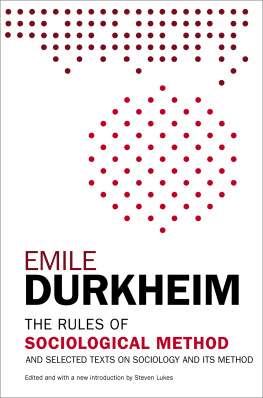Emile Durkheim - The Rules of Sociological Method: And Selected Texts on Sociology and its Method
Here you can read online Emile Durkheim - The Rules of Sociological Method: And Selected Texts on Sociology and its Method full text of the book (entire story) in english for free. Download pdf and epub, get meaning, cover and reviews about this ebook. year: 2014, publisher: Free Press, genre: Politics. Description of the work, (preface) as well as reviews are available. Best literature library LitArk.com created for fans of good reading and offers a wide selection of genres:
Romance novel
Science fiction
Adventure
Detective
Science
History
Home and family
Prose
Art
Politics
Computer
Non-fiction
Religion
Business
Children
Humor
Choose a favorite category and find really read worthwhile books. Enjoy immersion in the world of imagination, feel the emotions of the characters or learn something new for yourself, make an fascinating discovery.

- Book:The Rules of Sociological Method: And Selected Texts on Sociology and its Method
- Author:
- Publisher:Free Press
- Genre:
- Year:2014
- Rating:5 / 5
- Favourites:Add to favourites
- Your mark:
- 100
- 1
- 2
- 3
- 4
- 5
The Rules of Sociological Method: And Selected Texts on Sociology and its Method: summary, description and annotation
We offer to read an annotation, description, summary or preface (depends on what the author of the book "The Rules of Sociological Method: And Selected Texts on Sociology and its Method" wrote himself). If you haven't found the necessary information about the book — write in the comments, we will try to find it.
The Rules of Sociological Method: And Selected Texts on Sociology and its Method — read online for free the complete book (whole text) full work
Below is the text of the book, divided by pages. System saving the place of the last page read, allows you to conveniently read the book "The Rules of Sociological Method: And Selected Texts on Sociology and its Method" online for free, without having to search again every time where you left off. Put a bookmark, and you can go to the page where you finished reading at any time.
Font size:
Interval:
Bookmark:

Thank you for downloading this Free Press eBook.
Join our mailing list and get updates on new releases, deals, bonus content and other great books from Free Press and Simon & Schuster.
C LICK H ERE T O S IGN U P
or visit us online to sign up at
eBookNews.SimonandSchuster.com

Notes on
Letters about
The story of English translations of Durkheims major works has not been an especially happy one. The earliest translationsof Elementary Forms of Religious Life (Durkheim 1915), The Division of Labor in Society (Durkheim 1933) and The Rules of Sociological Method (Durkheim 1938)were defective, sometimes seriously so. (should one, for instance, respect the authors unclarities and ambiguities or help the reader by plumping for precision?) and in part because the barriers separating a past author from present readers tend to rise up with time and generational change (so should the translator try to lower them?).
The present edition of The Rules offers the reader a revised version of that published in 1982. It includes a chronology of Durkheims life and works and suggestions for further reading. The revisions to the translation are intended to attain maximum precision, both linguistic and conceptual, where the English can be rendered closer to the French, which sometimes means strengthening and sometimes weakening the earlier renderings of what Durkheim wrote. They also aim at consistency of usage of key terms within the text. And they seek fidelity to Durkheims intentionswhat he was meaning to say, insofar as this is ascertainablewhich sometimes means opting for vagueness and ambiguity and even for anachronism where implicit reference is made to a past thinker or school of thought. I want here to acknowledge the invaluable assistance of Raphaelle Thery, who meticulously checked the entire translation. The original French volume of Les rgles de la mthode sociologique (second edition), published in 1901, which is translated here, contained, according to the convention of the time, an extended table of contents. This is included here, following the text of the book, in order further to aid readers in navigating the text.
Durkheims intentions were in the process of development and it is important to note that The Rules is a transitional work. As Durkheim himself notes, in his letter to the Revue no-scolastique responding to Simon Deploige, included here, it was precisely in 1895, when The Rules was published as a book, that he found a means of tackling sociologically the study of religion (199). That year, he wrote, marked a watershed in my thinking, so much so that all my previous research had to be started all over again so as to be harmonized with these new views. That is one reason for the inclusion of Durkheims subsequent methodological reflections, in the form of debates with fellow scholars from neighboring disciplines, short notes and letters, so that the enterprising reader can trace continuities and changes in relation to the positions taken in the text of The Rules. For guidance in this such a reader should find helpful Durkheims Preface to the second edition of the book, published in 1901, in which he seeks to defend those positionsor better, perhaps, reformulate them in order to render them, or so at least he thought, more defensible.
What should be evident from these textsfrom Durkheims combative manifesto for sociology, from the objections of his numerous critics and from his energetic responses to these over timeis that they center on issues that are still very much alive within sociology and, more widely, in the social sciences at large. Here the reader will find debated a range of questions to which there are still today no settled, agreed-upon answers. Is the doctrine of methodological individualism successfully refuted by what is now called the concept of emergence? And how are we to decide when the evidence confirms and when it decisively refutes theories in the social sciences?
The worst example is the omission from the Solovay and Mueller translation of The Rules (Durkheim 1938) of an entire paragraph, about structural or morphological facts forming the substratum of collective life, that is essential to the argument of the first chapter of The Rules and indeed, as I argue here in the Introduction, to understanding the development of Durkheims thought. For a list of the more egregious mistranslations in The Rules and The Division , see appendix to Lukes 1968. For discussions of Swains translation of Elementary Forms see Fieldss introduction to Durkheim 1995 and Fields 2005. For a general discussion of these issues see Lukes 2012.
The situation regarding Durkheims Suicide differs from that of the other three works cited. Here the earlier translation (Durkheim 1951) is adequate and serviceable, whereas the new translation, though generally accurate and easy to read, makes bad decisions, translating goisme throughout as egotism, which suggests selfishness, whereas Durkheim intended isolation and detachment, which egoism (used in the earlier translation) allows. It also specifies the meaning of Durkheims socit a term he notoriously left undefinedin different ways at different points, thereby masking Durkheims uncertainty and unclarity as to the meaning of this crucial word.
For a forceful present-day defense of the concept of emergence, advancing a relational theory of emergent properties as applicable to the analysis of the social world, see Elder-Vass 2010.
See the remarkable book by John Levi Martin (2011), which sharply disputes this idea (citing Durkheims endorsement of it on p. 143), in the service of a broader argument which contests the very idea, prevalent in the social sciences, that the most important sort of explanation is one that comes in the form of a third-person answer to a why question (p. 24). For Levi Martin the social sciences have gone seriously astray by inheriting from Freud and from Durkheim inappropriate and untenable conceptions of causation and explanation.
Canguilhem, Georges 1991. The Normal and the Pathological. Translated by Catherine R. Fawcett with an Introduction by Michel Foucault. Brooklyn, NY: Zone Books (first published in French in 1943 and a fuller version in 1966).
Daston, Lorraine and Galison, Peter 2008. Objectivity. Brooklyn, NY: Zone Books.
Durkheim, Emile 1915. Elementary Forms of the Religious Life: A Study in Religious Sociology. Translated by J. W. Swain. London: Allen and Unwin; New York: Macmillan.
Durkheim, Emile 1933. The Division of Labor in Society. Translated by G. Simpson. New York: Macmillan.
Durkheim, Emile 1938. The Rules of Sociological Method. Translated by S. A. Solovay and J. H. Mueller and edited with an introduction by G. E. G. Caitlin. Chicago: Chicago University Press, republished 1950 by Glencoe, IL: Free Press of Glencoe.
Durkheim, Emile 1951. Suicide: A Study in Sociology . Translated by J. A. Spaulding and G. Simpson. Glencoe, IL: Free Press of Glencoe and London: Routledge & Kegan Paul.
Durkheim, Emile 1995. Elementary Forms of Religious Life . Translated with an Introduction by Karen Fields. New York: The Free Press.
Durkheim, Emile 2006. On Suicide. Translated by Robin Buss with an Introduction by Richard Sennett and Notes by Alexander Riley. Harmondsworth and New York: Penguin Books.
Elder-Vass, Dave 2010. The Causal Power of Social Structures: Emergence, Structure and Agency. Cambridge and New York: Cambridge University Press.
Font size:
Interval:
Bookmark:
Similar books «The Rules of Sociological Method: And Selected Texts on Sociology and its Method»
Look at similar books to The Rules of Sociological Method: And Selected Texts on Sociology and its Method. We have selected literature similar in name and meaning in the hope of providing readers with more options to find new, interesting, not yet read works.
Discussion, reviews of the book The Rules of Sociological Method: And Selected Texts on Sociology and its Method and just readers' own opinions. Leave your comments, write what you think about the work, its meaning or the main characters. Specify what exactly you liked and what you didn't like, and why you think so.

